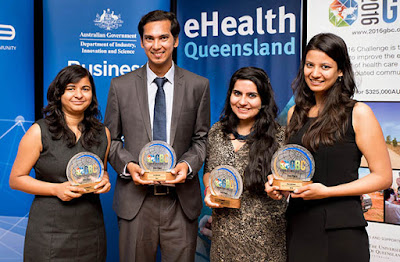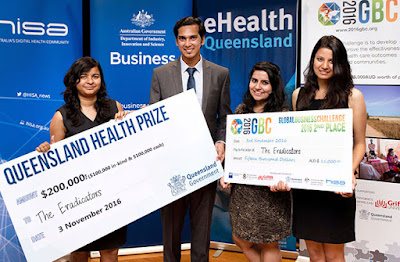IIMB’s PGP2 team bags 2nd spot in 2016 Global Business Challenge
Win a cash prize worth AUD 15,000, and Queensland Health Prize worth AUD 200,000 to implement the pilot using business idea
07 November, 2016 : A team from IIM Bangalore named ‘The Eradicators’ comprising four students from the 2015-17 Post Graduate Programme (PGP) batch, under the mentorship of Dr. Arnab Mukherji, Chairperson, Centre for Public Policy at IIMB, has bagged the second place in the finals of the prestigious 2016 Global Business Challenge, a case competition conducted by the Queensland University of Technology, Australia.
The Global Business Challenge is a graduate business case competition where contestants design sustainable solutions for global problems. Conducted as a partnership between Queensland University of Technology, the University of Queensland and Griffith University and with the support of government and industry, the competition invites implementable and practical solutions for some of the biggest contemporary problems across the globe. The ultimate objective is to scale up and implement the solution for which the winning team is awarded cash prizes and the opportunity to work under the mentorship of industry experts and leaders.
While the IIMB team has won a cash prize worth AUD 15,000 as the second prize, their work has been recognized by the government’s health department as well, and the team also won the Queensland Health Prize. This organization has decided to fund their venture for AUD 200,000 to implement a mobile clinic to address healthcare needs in remote and far-flung areas.
The four PGP2 students, Deepesh Gupta, Kanika Bansal, Priyanka Bagai and Priya Jindal, battled five other teams to acquire the second spot in the finals, held in Brisbane from October 31 to November 3, 2016. The other finalists for the 2016 GBC were Queensland University of Technology (Australia), University of Melbourne, Melbourne Business School (Australia), Memorial University (Canada), Heinrich Heine University Düsseldorf (Germany), University of Calgary (Canada), University of Exeter, University of Southampton, SOAS University of London (UK) & Chulalongkorn University College of Public Health Sciences (Thailand).
The competition was held in two stages. The first stage invited applications from over 45 universities across the world. The submissions required teams to design a scalable, economical solution – define the concept and substantiate the idea with potential alliances, technology needed and the preliminary financial budgeting. The teams faced off over two rounds to progress to the finals.
IIMB’steam members hail from diverse backgrounds. Deepesh Gupta pursued Engineering Physics from IIT Delhi, and has four years of experience in Pharmaceuticals Consulting. Kanika Bansal is an Instrumentation Engineer from IIT Kharagpur. Priyanka Bagai is from Shri Ram College of Commerce (SRCC) and comes with three years of experience in International Strategic Consulting while Priya Jindal, also a Commerce graduate from SRCC, is the tech-enthusiast in the group having played the role of a Product Manager at Groupon. The team mentor, Dr. Arnab Mukherji, is an applied micro-economist whose earlier work focused on the economics of healthcare and governance with a focus on India, and his work has been published in several peer-reviewed journals and as book chapters.
The challenge : One of the core challenges facing healthcare providers globally is the identification of new clinical services and technologies to deliver better and more affordable healthcare to communities facing a combination of social, cultural and physical isolation. The GBC is a vehicle to utilize the competition and collaboration environment to identify and propose novel solutions. The challenge was to develop solutions to improve the effectiveness and cost of healthcare outcomes for isolated communities.”
We wanted to bring something uniquely Indian to the table. Despite the stark differences in both our countries, we felt that we could help solve their healthcare problems by leveraging contemporary Indian technology. Far-reaching effectiveness at unbelievably low price points – that’s what we aimed to deliver,” said Priyanka Bagai, team member, on their motivation for the challenge.
The solution formulated by IIMB team : The business idea required to have scalability, regional and global impact, improved access to health services as well as cost effectiveness. In the finals, the solution was needed to be designed for isolated communities in South West Queensland. The gaps identified for isolated communities by the IIMB team were ageing population and increasing burden of chronic diseases (such as diabetes, cardiovascular diseases, etc.). The proposed solution for the identified gaps is a “Clinic on wheels” – a community van which has an inbuilt clinic. It enables mobilization and digitization of diagnostic services to remote areas. The clinic will consist of a nurse along with low-cost technology device.
The key characteristics of the solution include the incorporation of low-cost technology healthcare services along with proactive community engagement, empowerment and education to encourage healthier and sustainable lifestyles. Data collection, monitoring and analytics is also an integral component. However, the value of the solution lies in its flexibility to modify its scope and services in response to unique constraints and the disease burden of different communities.
Clinic on wheels will deliver a multitude of benefits including improved access to healthcare through last mile service delivery and reduced health expenditure for all stakeholders on account of early detection of diseases.
The IIMB team was required to develop a 50-page business case document along with an investor’s pitch for the business idea.
Deepesh Gupta, one of the team members said on winning, “The experience was one of a kind – the rigour of a 48-hour lockdown, the opportunity to present in front of senior executives in Australia, the gala dinner, the cultural interaction with seven universities across the world – it was all very exhilarating!!”
Kanika Bansal thanked the host country for providing this unique opportunity. She said, “The Australian government has given us an amazing opportunity to apply our education and experience to make a difference. Of course, it is going to be a challenge – working in indigenous areas in Australia, but the end impact will make it worth it.”
Visit @ IIM-Bangalore


